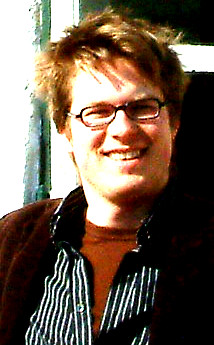Dienstag, Oktober 30, 2007
Another Loss
Bielefeld-University. Today I've left another important thing behind - a widget which allows me to keep my internal organs in running order: my thermosbottle until the afternoon filled with refreshing white tea eventually emptied during a class about EU-policies in foreign affairs. This loss just adds another link to an apparently neverending chain of losses. There's two options in detecting my property: either room V2-200 where the class was or university radio Hertz 87,9 where I spent the commencing evening. Actually, there's another option: ikea, ground floor, housewares, "Hälsa", 4,90 Euro.Pronunciation
Bielefeld-University/Center. Mumbling and nearly sleeping I discovered yesterday around midnight that my tongue starts to flutter when my mouth forms the word "perro". My pronunciation training seems to pay off. Evening after evening I tried to vocalize what I call "the Spanish r". Lately I've found a book with helpful hints: "Sprechtechnisches Übungsbuch" by Vera Balser Eberle, available at my university library (yes, I know, the library isn't de facto mine). Eberle (1976) gave me an idea of how to move my tongue while trying to talk Spanish (though I lack a sufficient vocabulary): "Die Zungenspitze wird dünn hinter die oberen Schneidezähne eführt, wo sie aber nicht ruhig verharrt, sondern mittels des durchziehenden Luftstromes in Vibration versetzt wird" (p. 55). She recommends the technique of the famous French actor François-Joseph Talma: The learner says first slowly and then with an increasing pace "t-d-t-d-t-d-t-d-t-d-t" with a stress on the "t". Then he repeats several times the word-combination "dé-tavail" to add subsequently the "r" - like that: "dé-tavail, dé-tavail, dé-tavail - - - - travail". Et voilà. Another simple way to get a feeling for the right tongue move: Put a biro in your mouth, under the tongue and recite that (advise of my teacher). Geistesnahrung
Bielefeld-Center. I just have started to prepare an oral exam on "Communities of Practice" - a topic which I encountered especially during my stay in Roskilde. Etienne Wenger, Richard McDermott and William M. Snyder wrote a generally intelligible book on these "groups of people who share a concern, a set of problems, or a passion about a topic, and who deepen their understanding and knowledge of this area by interacting on an ongoing basis" (p. 3 of the draft of that book) and describe communities of practice as a phenomenon of human learning which consists of learners approaching a group of proprietors of knowledge including that these "newcomers" adds new knowledge to such a community of practice. Most of the chapters of the book "Cultivating Communities of Practice: a Guide to Managing Knowledge" are to be found on the internet: go here and there (second link).
Abonnieren
Kommentare zum Post (Atom)


3 Kommentare:
haha ich hab das "R" auch ewig geübt.
Ohne Ton übt sich das am Besten. Also nur mit Zunge und Luft.
Und als Übungssatz: "Der rasende Roland rollt über Rügen."
Hab das immer im Zug geübt bis die Leute mich zu doof angeguckt haben :)
Viel Spaß
Mensch JÖK!
Ich schau hier immer vergeblich rein...
Ich hab Abhilfe geschaffen. Nichts zum Lesen, aber jede Menge zu Gucken.
Kommentar veröffentlichen